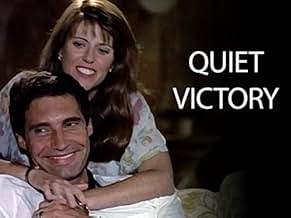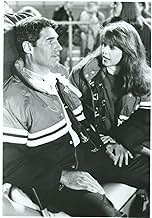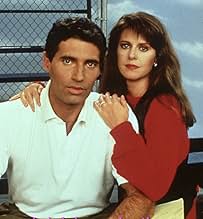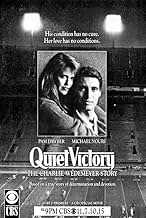IMDb RATING
6.8/10
176
YOUR RATING
A real-life story about a high school teacher and football coach who is diagnosed with Lou Gehrig's disease but refuses to give in.A real-life story about a high school teacher and football coach who is diagnosed with Lou Gehrig's disease but refuses to give in.A real-life story about a high school teacher and football coach who is diagnosed with Lou Gehrig's disease but refuses to give in.
- Director
- Writer
- All cast & crew
- Production, box office & more at IMDbPro
Storyline
Did you know
- TriviaThe voice of the singer of 'Looking Through The Eyes Of Love' at the tribute party for Charlie is his real life daughter, Carri Wedemeyer, who also has a bit part as a waitress in the film.
- ConnectionsReferences The Pride of the Yankees (1942)
- SoundtracksLooking Through The Eyes Of Love
performed by Carri Wedemeyer
Featured review
"A Quiet Victory: The Charlie Wedemeyer Story" is a story about triumph. Or is it?
Charlie Wedemeyer, played by Michael Nouri, was a Hawaiian kid and a decent football player that played at Michigan State. He married his high school sweetheart Lucy (Pam Dawber), had two kids, and settled in Los Gatos, California where he taught at Los Gatos High School. He was awarded the head coaching position there where he turned around a beleaguered team. Life was dandy.
Then he found out that he had ALS. Nowadays we commonly know it as ALS (especially because of the famous ice bucket challenge), but for years it was always known as Lou Gehrig's disease. It is a muscular disease in which the muscles stop functioning including the involuntary muscles. It is terminal and there is no known cure.
Initially, it was no impedance to his coaching. His team kept on winning though they would fall short of the Central Coast Sectional Championship (for years California didn't have a state championship football game, just sectional championships). Eventually, the ALS was so bad he could barely walk and barely talk, yet he kept on coaching. Then it got to the point he couldn't walk and couldn't talk, yet he kept on coaching with his wife reading his lips and conveying his words.
On the one hand this is a triumph story. Here is a guy that is eking ever closer to death and he refuses to give up doing what he loves.
And then there is the other narrative. The other narrative probably would never be spoken aloud because the person who says it would sound like an insensitive jerk. The other narrative would be that Charlie was a bully holding the team hostage with his handicap. Who in the world would be so cruel as to tell a dying man to step down from coaching even if it is enormously inconvenient and a trial on all involved. It was to the point of being unfair to the other coaches and you could even say the players as well. Being a head coach is very involved and to be a good one requires all of one's faculties. No one could understand him, he wasn't mobile, and all of his brilliant plays were in his head. But the team kept winning.
I'm happy his team kept on winning under his leadership, and I'm sure everyone loves Charlie, but I happen to also think he should've recognized the pity and shyness in everyone's eyes and stepped down. No one wanted to be the bad guy and fire an invalid coach that everyone loved or at least pitied. Who wanted to be the bearer of news that may very well be what kills him because he has nothing else to live for? And to tell the truth, I wouldn't either. I would've silently suffered like the other players and coaches while I tried to learn patience dealing with a terminally ill coach.
Charlie Wedemeyer, played by Michael Nouri, was a Hawaiian kid and a decent football player that played at Michigan State. He married his high school sweetheart Lucy (Pam Dawber), had two kids, and settled in Los Gatos, California where he taught at Los Gatos High School. He was awarded the head coaching position there where he turned around a beleaguered team. Life was dandy.
Then he found out that he had ALS. Nowadays we commonly know it as ALS (especially because of the famous ice bucket challenge), but for years it was always known as Lou Gehrig's disease. It is a muscular disease in which the muscles stop functioning including the involuntary muscles. It is terminal and there is no known cure.
Initially, it was no impedance to his coaching. His team kept on winning though they would fall short of the Central Coast Sectional Championship (for years California didn't have a state championship football game, just sectional championships). Eventually, the ALS was so bad he could barely walk and barely talk, yet he kept on coaching. Then it got to the point he couldn't walk and couldn't talk, yet he kept on coaching with his wife reading his lips and conveying his words.
On the one hand this is a triumph story. Here is a guy that is eking ever closer to death and he refuses to give up doing what he loves.
And then there is the other narrative. The other narrative probably would never be spoken aloud because the person who says it would sound like an insensitive jerk. The other narrative would be that Charlie was a bully holding the team hostage with his handicap. Who in the world would be so cruel as to tell a dying man to step down from coaching even if it is enormously inconvenient and a trial on all involved. It was to the point of being unfair to the other coaches and you could even say the players as well. Being a head coach is very involved and to be a good one requires all of one's faculties. No one could understand him, he wasn't mobile, and all of his brilliant plays were in his head. But the team kept winning.
I'm happy his team kept on winning under his leadership, and I'm sure everyone loves Charlie, but I happen to also think he should've recognized the pity and shyness in everyone's eyes and stepped down. No one wanted to be the bad guy and fire an invalid coach that everyone loved or at least pitied. Who wanted to be the bearer of news that may very well be what kills him because he has nothing else to live for? And to tell the truth, I wouldn't either. I would've silently suffered like the other players and coaches while I tried to learn patience dealing with a terminally ill coach.
- view_and_review
- Feb 27, 2020
- Permalink
Details
- Release date
- Country of origin
- Language
- Also known as
- La victoire de Charlie
- Filming locations
- O'ahu, Hawaii, USA(Hawaiian exterior scenes, including beach and airport scenes)
- Production companies
- See more company credits at IMDbPro
Contribute to this page
Suggest an edit or add missing content

Top Gap
By what name was Quiet Victory: The Charlie Wedemeyer Story (1988) officially released in Canada in English?
Answer


























